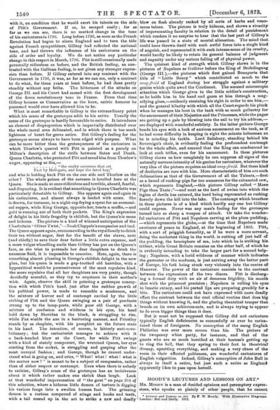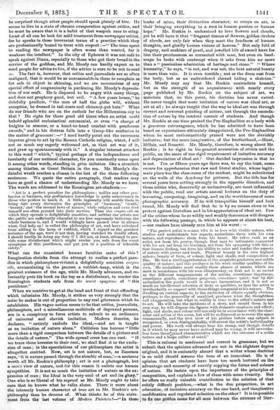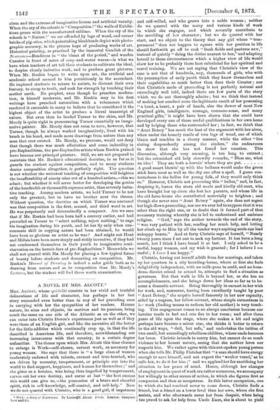MOODY'S LECTURES AND LESSONS ON ART.* MR. MOODY is a
man of decided opinions and peremptory expres- sions, who speaks so plainly of other people, that he cannot Lectures and Lessons on Art. By F. W. Moody. With Illustrative Diagrams London: Bell and Daldy. 1873. be surprised though other people should speak plainly of him. He seems to live in a state of chronic exasperation against critics, and he must be aware that it is a habit of that waspish race to sting. Least of all can he look for mild treatment from newspaper critics, for he speaks in these irreverent terms of a practice which they are professionally bound to treat with respect :—" The time spent in reading the newspaper is often worse than wasted, for it weakens the intellect." In the city of Ephesus it was not safe to speak against Diana, especially to those who got their bread in the service of the goddess, and Mr. Moody can hardly expect us to send people for advice to him, if the advice is sure to be not to read us. The fact is, however, that critics and journalists are so often maligned, that it would be as unreasonable in them to complain as for eels to object to skinning, and we are unconscious of any special effort of magnanimity in pardoning Mr. Moody's deprecia- tion of our craft. He is disposed to be angry with many things, and does not prophecy good, but evil. "A few years hence," he dolefully predicts, "the men of half the globe will, without exception, be dressed in tail-coats and chimney-pot hats." What do our friends who are on the outlook for the Millennium say to that ? He sighs for those good old times when an artist could behold splendid ecclesiastical ceremonial, or even "a charge of knights in armour, or a hand-to-hand combat with ponderous swords," and in his distress falls into a Gamp-like confusion in the matter of grammar :—" I need hardly point out the enormous impetus given to art by the Roman Catholic religion, which, I will not so much say eagerly welcomed art, as that art was of it, and grew up spontaneously with it." A singular interest attaches to this word "which," typical perhaps of the independence and insularity of our national character, for you constantly come upon it among other words, standing in grim isolation like a cromlech among thistles, or Great Britain in the sea. Mr. Moody's die- dainful wrath reaches a climax in the last of the three following sentences. We quote the entire paragraph, that readers may have as good a chance of understanding Mr. Moody as we have. The words are addressed to the Kensington art-students :— " Art i,s a perfect paradise for philosophers ; unlike any other pro- fession or business, any preliminary knowledge is quite unnecessary in Wine who profess to teach it. A little ingenuity will enable them to bring into every discussion the principles of harmony," truth,' ' beauty,' and the eternal laws of nature,' while religion and even God himself are often pressed into their service. Then the corpus vile on which they operate is delightfully sensitive, and neither our artists nor the public are sufficiently educated to see how supremely ludicrous the whole business is, and I would willingly have passed over in silence what, God help us ! is called the philosophy of art, and have refrained from adding to the heap of rubbish, which I regard as the greatest nuisance of the age, were it not that, having watched its deadly effect, I should hardly be doing my duty if I did not, at least, attempt to pro- vide some disinfectant which might render you safe from the worst symptoms of this pestilence, and put you in a position of tolerable safety."
What can the unassisted human faculties make of this ? Imagination shrinks from the attempt to realise a perfect para- dise in which philosophers vivisect a delightfully sensitive corpus vile, accumulating in the process a rubbish-heap, which is the greatest nuisance of the age, while Mr. Moody advances, and re- luctantly puts his book on the top as a disinfectant, to render the Kensington students safe from the worst symptons of "this pestilence."
When we contrive to get at the head and front of that offending which infuriates Mr. Moody, it strikes us very strongly that the noise he makes is out of proportion to any real grievance which he establishes. His vague notion seems to be that critics, journalists, philosophers, and a miscellaneous multitude of depraved persons, are in a conspiracy to force artists to submit to an ordinance of universal and slavish imitation. Modern theories, he declares, "entirely exclude the ideal,—and art is taught as an imitation of nature alone." Criticism has become "little more than a rigid comparison between the details of a picture and the details of nature." The wide-spread error has one root. "If we trace these heresies to their root, we shall find it in the exclu- sion of man ; in the speculations of our philosophers the artist is altogether omitted. Now, art is not nature, but, as Emerson says, it is nature passed through the alembic of man,'—a sentence worth all Mr. Ruskin's philosophy ; art is not a photograph, but a man's view of nature, and for this reason it enlists our human sympathies. It is not so much the imitation of nature as the ex- pression of man ; the Ideal is the very soul of art and its gloryd" One who is so liberal of his reproof as Mr. Moody ought to take care that he knows what he talks about. There is more about the intensely human character of true art in Mr. Ruskin's art- philosophy than he dreams of. What thinks he of this state- ment from the last volume of Modern Painters ?—" In these books of mine, their distinctive character, as essays on art, is their bringing everything to a root in human passion or human hope." Mr. Ruskin is understood to love flowers and clouds, yet he will have it that "fragrant tissues of flowers, golden circlets of clouds, are only fair when they meet the fondness of human thoughts, and glorify human visions of heaven." Not only fold of drapery, and necklace of pearl, and jewelled hilt of sword have for him their preciousness as connected with man, but even on land- scape he looks with contempt when it asks from him no more than a "passionless admiration of herbage and stone." "Where humanity," he says, "is not, and was not, the best natural beauty is more than vain. It is even terrible ; not as the dress cast from the body, but as an embroidered shroud hiding a skeleton." Mr. Moody may say that Mr. Ruskin contradicts himself, but on the strength of an acquaintance with nearly every page published by Mr. Ruskin on the subject of art, we maintain that, on this point, his doctrine has never varied. He never taught that mere imitation of nature was ideal art, or art at all ; he always taught that the way to ideal art was through correct and reverent painting of nature, not through the emenda- tion of nature by the insolent conceit of students. And though Mr. Ruskin at one time praised the Pre-Raphaelites as a body with a generous extravagance, which he has admitted to have been based on expectations ultimately disappointed, the Pre-Raphaelites whom he most enthusiastically praised were not the slavishly imitative, but the more imaginative, of the brotherhood,—Hunt, Millais, and Rossetti. Mr. Moody, therefore, is wrong about Mr. Ruskin ; is he right in his general accusation of critics and the public, on the score of too rigid requirement of imitative accuracy and depreciation- of ideal art ? Our decided impression is that he is not. Ten or fifteen years ago there was, to say the least, some excuse for apprehension that raw and literal studies, whose legiti- mate place was the class-room of the student, might be substituted on the walls of the Academy for pictures. But the tide has for several years been setting strongly in the opposite direction, and those critics who, deservedly or undeservedly, are most influential with the public, read our artists annual lectures on the duty of inventing, composing, imagining, and on the worthlessness of mere photographic accuracy. If he will tranquillise himself and look round, Mr. Moody will find that he is by no means alone in his protest against literalism and in his appreciation of ideal art. Few of the critics whom be so wildly and weakly denounces will disagree with the following passage, in which he appears at about his best, —our readers have already seen him at his worst : — "The perfect artist is a man who is in love with visible nature, who studies and understands her aspects, assimilates them with his own nature, and reproduces them from his heart. He takes rank as an artist, not from his poetry, though that may be intimately connected with his art, not from his teaching, not from his sympathy with this or that human feeling, but from his ability to seize and render the aspects of nature with power and truth. Physical beauty is his own highest sphere, beauty of form, of colour, light and shade and composition of line. He has a vivid apprehension of the exquisite and subtle quality of nature, and this produces in his work similar qualities of his own. He assimilates most readily those phases of nature which are most in accordance with his own idiosyncrasy, so that art is as varied as the different temperaments of the artists, sometimes impetuous, sometimes gentle, sometimes gorgeous, sometimes quiet ; but by this assimilation the poetic result is always harmonious, and it is not so much an intellectual Selection of facts or qualities, as that the artist is involuntarily en rapport with those things congenial to his nature. The dwelling-on certain aspects, to the exclusion of others equally obvious, perhaps, to the generality of mankind, produces what the thoughtless call exaggeration, but what in reality is true to the artist's nature and to art. He will take the incidents of a story, and mould them in his own way, he will dispose his figures with dramatic emphasis and effect ; light, and shade, and colour will not only be in accordance with the char- acter and action of the scene, but will be so disposed as to cover the space ornamentally, and the first view of his picture before any subject is recognised, or even distinguishable' will reveal the artist's individuality and power. His work will always bear his stamp, and though details in it which he may never have noticed may be wrong, it will neverthe- less have those:grand characteristics which are the outcome of a noble nature and a large calibre of mind."
This is rational in sentiment and correct in grammar, but we submit that the opinions advanced are not in the slightest degree original, and it is eminently absurd that a writer whose doctrine is so mild should assume the tone of an iconoclast. He is of opinion that art students have been too much lectured on the advantage and necessity of exactly copying the forms and colours of nature. He insists upon the importance of the principles of composition, and explains a few of them with some vivacity. But her offers no really valuable contribution to the solution of that subtly difficult problem,—what is the due proportion, in art education, of imitative accuracy on the one hand, and imaginative modification and regulated selection on the other? It is impossible to fix one golden mean for all men between the extreme of liter-
alism and the extreme of imaginative license and artificial vacuity. When the cry of the schools is "Composition !" the walls of Exhibi- tions groan with the manufactured sublime. When the cry of the schools is "Nature !" we are offended.by logs of wood, and corner bricks of pig-sties, which painstaking blockheads depict with photo- graphic accuracy, in the piteous hope of producing works of art. Historical painting, as practised by the immortal Gandish of the Newcontes—Boadiceas in "the 'elmet of the period," and wooden Canntes in front of acres of soap-and-water waves—is what we have when teachers of art tell their students to cultivate the ideal, to despise closely imitative work, and to produce great pictures. When Mr. Ruskin began to write upon art, the artificial and academic school seemed to him perniciously in the ascendant. He implored students to return to nature, to distrust their own fantasy, to stoop to truth, and seek for strength by touching their mother earth. No prophet, even though he preaches modera- tion, is himself moderate, and Mr. Ruskin may in his first writings have preached naturalism with a vehemence which rendered it excusable in many to believe that he considered it the highest object of the artist to produce a literal transcript of nature. But even then he lauded Turner to the skies, and Mr. Moody is quite right in pronouncing Turner essentially an imagi- native painter. Mr. Moody does not seem to note, however, that Turner, though he always worked imaginatively, lived with his brush in his hand, and made more drawings from nature than any man that ever existed. Mr. Moody, we presume, would not deny that though there was much affectation and some imbecility in pre-Raphaelitism, the pre-Raphaelite artists whom Ruskin praised have become our principal painters. Still, we are not prepared to maintain that Mr. Ruskin's educational doctrine, in so far as it guards the student against composition, and to many students denies composition altogether, is perfectly right. The question is not whether the universal teaching of composition will heighten the insufferability of ninety-nine out of a hundred artists,—this we admit; but whether it will serve better for developing the genius of the hundredth or thousandth supreme artist, than severely imita- tive teaching. Among modern artists, we bold Turner to be not only the greatest, but to have no brother near the throne. Without question, the doctrine on which Turner was nurtured was that composition is the first, second, and third word in art. He was perpetually and determinedly a composer. Are we sure that if Mr. Ruskin had been born half a century earlier, and had prevailed on Turner to "select nothing, reject nothing," to cage his imagination during his youth, and let her fly only when con- summate skill in copying nature had been attained, he would have been so glorious an artist as he was? And might not Hunt and Millais have been more simply and richly inventive, if they had not condemned themselves in their youth to imaginative semi- starvation on the hermit-fare of pre-Raphaelitism ? Meanwhile we shall not quarrel with Ms. Moody for placing a few typical forms of beauty before students and descanting on composition. Mr. Ruskin's Manual of Drawing is indeed a safer guide both as to drawing from nature and as to composition than Mr. Moody's Lectures, but the student will find these worth examination.








































 Previous page
Previous page